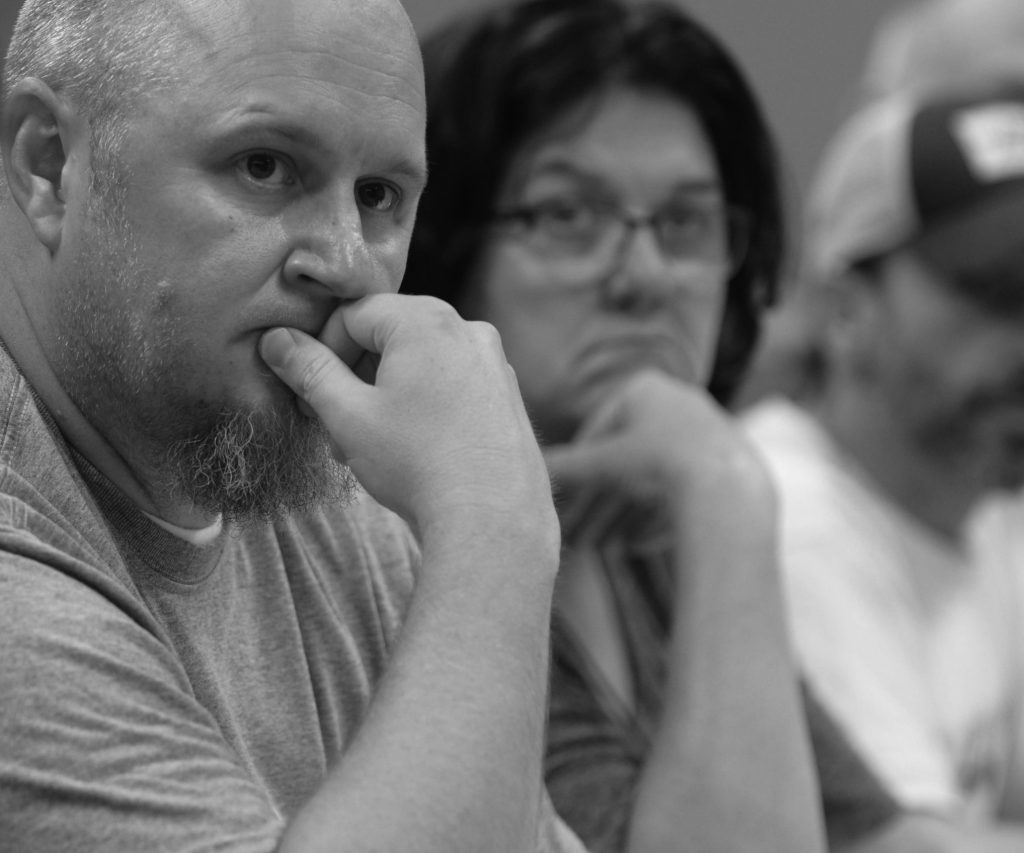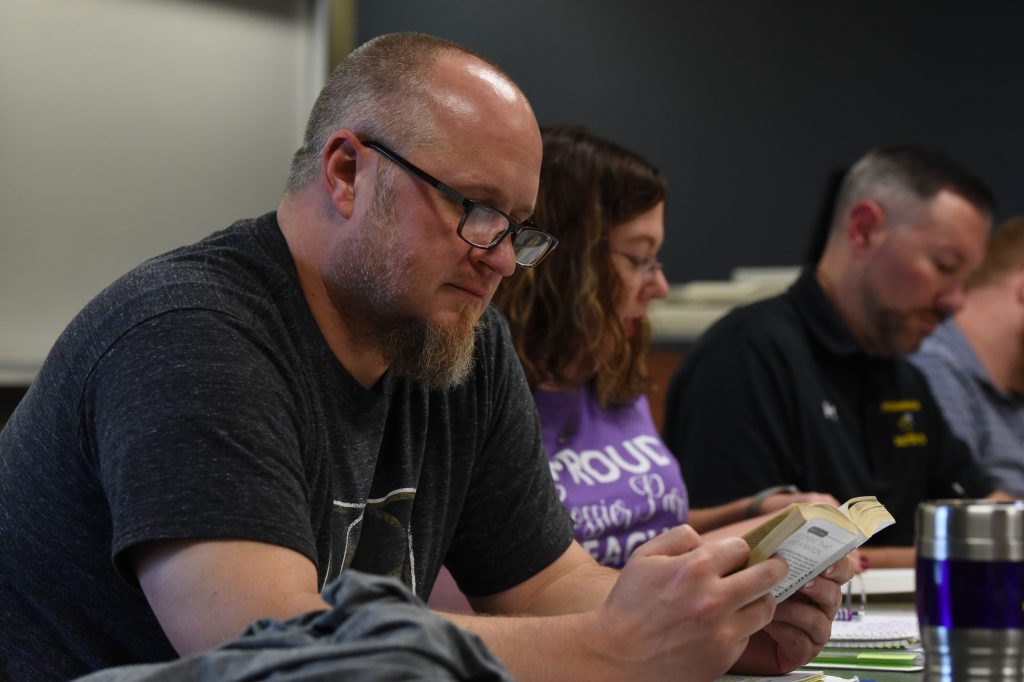What Does America Most Need Now?
March 29, 2021

What does America most need now? “People who remain committed to their core principles,” answers Kevin Barney, who teaches history and government at Veterans Tribute Career and Technical Academy in Las Vegas, Nevada. “Citizens’ principles should be stronger than the passions of the day.”
Most of Barney’s students are second-generation Latino immigrants. Many applied to the small public magnet school (with a student body of 800) because they are interested in public service jobs in law enforcement and emergency response, the focus of the elective classes at VCTCA. They also come to the school to get a high-quality education. Some leave high school and are immediately hired as 911 dispatchers; others enter police academies or complete their certification as Emergency Medical Technicians so as to join fire departments. Many go on to college and careers in other fields. They carry with them skills they learn in Barney’s classroom.
Few students begin Barney’s United States History course with a mental outline of American history already in place. Their immigrant parents could not pass along to them a history they did not know. Yet Barney does not set out to fill students’ minds with historical facts. “They have a phone on them”—they can look the facts up, Barney says. He frames his lessons “on what they’re going to do with the facts. How can they turn the facts into an argument?”
The Core Documents volumes published by Ashbrook provide Barney with the resources he needs to teach in this way. A graduate of Ashbrook’s Teaching American History graduate program, Barney studied the documents in seminars with other teachers, honing his ability to analyze the arguments and perspectives they contain.
Before Barney enrolled in the graduate program, “I used primary documents more as a supplement to the textbook. Now I use them as the base of what we do.” He guides students as they analyze the documents, helping them develop critical reading skills they will need in college, careers, and throughout their lives as citizens. In the meantime, students discover which points of view they agree with and which they do not. They begin to shape their own understanding of democracy and the principles that should guide it.
Barney’s courses are inquiry based, as he learned through his graduate studies. Barney offers examples: “‘How revolutionary was the Revolutionary War?’ and ‘Does the Bill of Rights still adequately protect citizens from the government?’—scholars still debate these questions; there are no necessarily right or wrong answers. This way of teaching is very Ashbrook style: you have a compelling question, supporting questions, and a whole bunch of historical sources students work through to answer those questions.”
Barney laughs, “With Ashbrook, the professors never answered the questions. It was always: ‘What do you guys think?’ The professors were really good at leading discussions—even at leading online discussions, which is not easy!”
Barney, alongside fellow Ashbrook teachers during a graduate class, with the desks arranged in a circle for discussion.
Barney models this approach in his own classroom, challenging students to work through the documents “Ashbrook style—we put our desks in a circle and discuss.” In one lesson for his U.S. Government class, Barney assigns each student a role and asks them to participate in a mock trial for a Supreme Court decision that they have read. Such small group exercises help reluctant speakers develop debating skills. Barney finds his students often “don’t want to be wrong in front of their peers. If they can sit quiet, they sit quiet.” He designs lessons so that “it’s not possible to be silent. If you’re the only one on your team with a certain role, you have to speak.”
Another lesson helps students discover their core political beliefs through the lens of the Federalist and Anti-Federalist debate during the ratification of the Constitution. Although “it’s easy to dismiss the so-called losers in history,” Barney concluded that the Anti-Federalists foresaw many of our current problems. Since then, Barney has asked his students to consider the Anti-Federalists’ case. He asks them to read Brutus I and summarize the author’s warnings that the new federal government will grow too powerful, losing touch with the will of the people. “Then I make them come up with modern examples of that happening.” Barney presented his lesson plan on the Anti-Federalists at the National Council for the Social Studies Annual Convention in 2017.
Barney has found that one of the most powerful lessons for his students is on the Civil War. Seeing how America’s Founding principles were threatened illustrates them all the more clearly to students. Barney assigns his students two documents that he read more than once during his Ashbrook graduate work: an excerpt of Lincoln’s long Peoria speech (1856) along with Confederate Vice President Alexander Stephens’ “Cornerstone” speech (1861). The latter proclaims that the Confederate government’s “cornerstone rests, upon the great truth that the negro is not equal to the white man; that slavery subordination to the superior race is his natural and normal condition.” Lincoln asserts the contrary understanding of democracy: “No man is good enough to govern another man, without that other’s consent. I say this is the leading principle—the sheet anchor of American republicanism.”

Barney asks students, “You need some evidence of what the Civil War was about? Well, what did they say it was about?” Students quickly realize that Americans knew “they were fighting over what the Declaration actually means—who democratic government is actually for.”
At the heart of Barney’s lessons is a desire to prepare his students to be thoughtful citizens. “I want them to discover a core ideology that’s more important to them than any partisanship” preoccupying the current news or social media stream. “I often tell my students, ‘I don’t care what you believe politically. I care why you believe it. I want to hear your evidence—why you think this is right.’ Students respond to that,” Barney says.
In the end, most students “discover that there is something at the core of America that holds us together. When first presented with the claim that all men are created equal, many of them think, ‘That’s just for white men.’ It takes a while, and maybe not everyone is convinced, but most realize that this is a universal declaration. It doesn’t mean we’ve always lived up to it.” Still, “whatever you may think about protests like the Black Lives Matter movement, those protesting want to be treated equally—that’s all it’s generally about. We all want the ideals in the Declaration to be totally true.”

